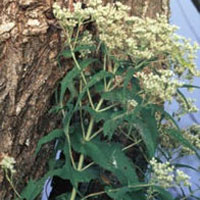Boneset
Uses
Parts Used & Where Grown
Boneset belongs to the same botanical family as echinacea and daisy (Asteraceae). It grows primarily in North America. Boneset’s leaves and flowering tops are used medicinally.
Our proprietary “Star-Rating” system was developed to help you easily understand the amount of scientific support behind each supplement in relation to a specific health condition. While there is no way to predict whether a vitamin, mineral, or herb will successfully treat or prevent associated health conditions, our unique ratings tell you how well these supplements are understood by the medical community, and whether studies have found them to be effective for other people.
For over a decade, our team has combed through thousands of research articles published in reputable journals. To help you make educated decisions, and to better understand controversial or confusing supplements, our medical experts have digested the science into these three easy-to-follow ratings. We hope this provides you with a helpful resource to make informed decisions towards your health and well-being.
3 Stars Reliable and relatively consistent scientific data showing a substantial health benefit.
2 Stars Contradictory, insufficient, or preliminary studies suggesting a health benefit or minimal health benefit.
1 Star For an herb, supported by traditional use but minimal or no scientific evidence. For a supplement, little scientific support.
This supplement has been used in connection with the following health conditions:
| Used for | Why |
|---|---|
|
1 Star
Common Cold and Sore Throat
Refer to label instructions
|
Boneset is an immune stimulant and diaphoretic that helps fight off minor viral infections, such as the common cold.
is an immune stimulant and diaphoretic that helps fight off minor viral infections, such as the common cold. Several double-blind trials have found that echinacea root tinctures in combination with boneset, wild indigo, and homeopathic arnica reduce symptoms of the common cold. In addition, linden and hyssop may promote a healthy fever and the immune system’s ability to fight infections. Yarrow is another diaphoretic that has been used for relief of sore throats, though it has not yet been researched for this purpose. |
|
1 Star
Influenza
Refer to label instructions
|
Boneset has been shown in studies to stimulate immune-cell function, which may explain its traditional use to help fight off minor viral infections, such as the flu.
has been shown in test tube and other studies to stimulate immune-cell function, which may explain it’s traditional use to help fight off minor viral infections, such as the flu. Wild indigo contains polysaccharides and proteins that have been reported in test tube studies to stimulate the immune system. The immune-enhancing effect of wild indigo is consistent with its use in traditional herbal medicine to fight the flu. However, wild indigo is generally used in combination with other herbs such as echinacea, goldenseal, or thuja. |
Traditional Use (May Not Be Supported by Scientific Studies)
Native Americans used boneset as a treatment for a wide range of infectious and fever-related conditions. Europeans eventually adopted the use of the plant, and extended its traditional uses to include malaria.1
How It Works
How It Works
Boneset contains sesquiterpene lactones, such as euperfolin, euperfolitin, and eufoliatin, as well as polysaccharides and flavonoids. In a test tube study, a particular polysaccharide in boneset was found to stimulate immune cell function.2 This may partially explain its use to treat minor viral infections, such as colds and the flu. Boneset also triggers sweating by raising body temperature, potentially of benefit for colds and flu as well.3
How to Use It
Traditionally, boneset is taken as a tea or tincture. To prepare a tea, boiling water is added to 1/4–1/2 teaspoon (1–2 grams) of the herb and allowed to steep, covered, for ten to fifteen minutes. Three cups (750 ml) a day may be taken (the tea is quite bitter). Tincture, 1/4–3/4 teaspoon (1–4 ml) three times per day, is also often taken.4
Interactions
Interactions with Supplements, Foods, & Other Compounds
Interactions with Medicines
Side Effects
Side Effects
A small number of people experience nausea and/or vomiting when using boneset. The fresh plant, however, is more likely to cause this than the dried herb. Although potentially liver-damaging chemicals, called pyrrolizidine alkaloids, are found in some plants similar to boneset, the levels in boneset are minimal. There are no known reports of liver damage from taking boneset. Nevertheless, patients with liver disease should avoid boneset, and no one should take it consistently for longer than six months. Boneset is not recommended during pregnancy or breast-feeding. Boneset should not be used when a high fever (over 102 degrees F) is present.
References
1. Castleman M. The Healing Herbs. New York: Bantam Books 1991, 124-8.
2. Woerdenbag HJ, Bos R, Hendriks H. Eupatorium perfoliatum L—the boneset. Z Phytother 1992;13:134-9 [review].
3. Mills SY. Out of the Earth: The Essential Book of Herbal Medicine. New York: Viking Arkana, 1991.
4. British Herbal Medicine Association Scientific Committee. British Herbal Pharmacopoeia. West Yorks, UK: British Herbal Medicine Association, 1983.
Last Review: 05-24-2015

Copyright © 2025 TraceGains, Inc. All rights reserved.
Learn more about TraceGains, the company.
The information presented by TraceGains is for informational purposes only. It is based on scientific studies (human, animal, or in vitro), clinical experience, or traditional usage as cited in each article. The results reported may not necessarily occur in all individuals. For many of the conditions discussed, treatment with prescription or over the counter medication is also available. Consult your doctor, practitioner, and/or pharmacist for any health problem and before using any supplements or before making any changes in prescribed medications. Information expires December 2025.



